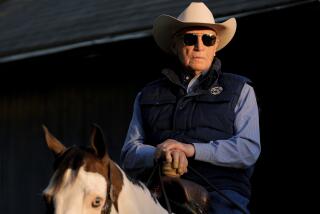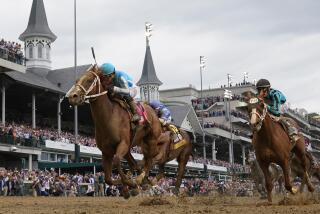‘68 Derby Provides Young Reporter With a Lesson in Journalism
- Share via
The spring of 1968 was a good time to learn a lot about the racing game as well as the newspaper business.
I arrived at the Louisville Times just a couple of months before the Kentucky Derby, unaware that a mutiny was brewing in the sports department. The staff was seething over the heavy-handed technique of Frank Hartley, the executive sports editor.
When it was announced on the Tuesday after the Derby that Dancer’s Image had been disqualified and the victory given to Forward Pass, you had to be a speed reader to keep up with the developments. There was an eruption of stories in the two Louisville newspapers, which left virtually no news angles uncovered.
Early in the second week after the Derby, Hartley told me to go to Churchill Downs and “find out something new about this mess.”
None of Dancer’s Image’s handlers were around, of course. They had gone on to Baltimore, where the colt was running in the Preakness. I ran into veterinarian Alex Harthill by accident, not even knowing him until he introduced himself.
Harthill gave me this hypothesis:
“Whoever gave the horse the bute (Butazolidin) did it the wrong way. He got it in tablet form, with a balling gun (a device that shoots pills into the horse’s mouth, to make sure he swallows them). That way, the drug stays in his system longer. If they had used a syringe, it wouldn’t have stayed in the horse’s system as long, and may not have turned up in the test after the race.”
Since Harthill was so closely linked to Dancer’s Image during Derby week, I thought I had something. But Hartley threw the story into the waste basket, in front of several other staff members, and said something about being able to get the same thing if he had sent me to the corner drug store.
Later that day, Bob Clark, the managing editor of the paper, came into the sports department. Clark, who had once been the newspaper’s medical writer, asked Hartley if anyone had examined how Dancer’s Image had been given the drug.
After Clark left, Hartley came over to my desk and asked if I had a carbon copy of the story. I did, and he ran it.
A year later, I left Louisville, and the Kentucky Derby that still wasn’t over.
A late arrival and a short-termer, I never really had time to participate in the mutiny at the Louisville Times, but it must have been successful. Frank Hartley was removed as executive sports editor, and sent to the state desk.
More to Read
Go beyond the scoreboard
Get the latest on L.A.'s teams in the daily Sports Report newsletter.
You may occasionally receive promotional content from the Los Angeles Times.










